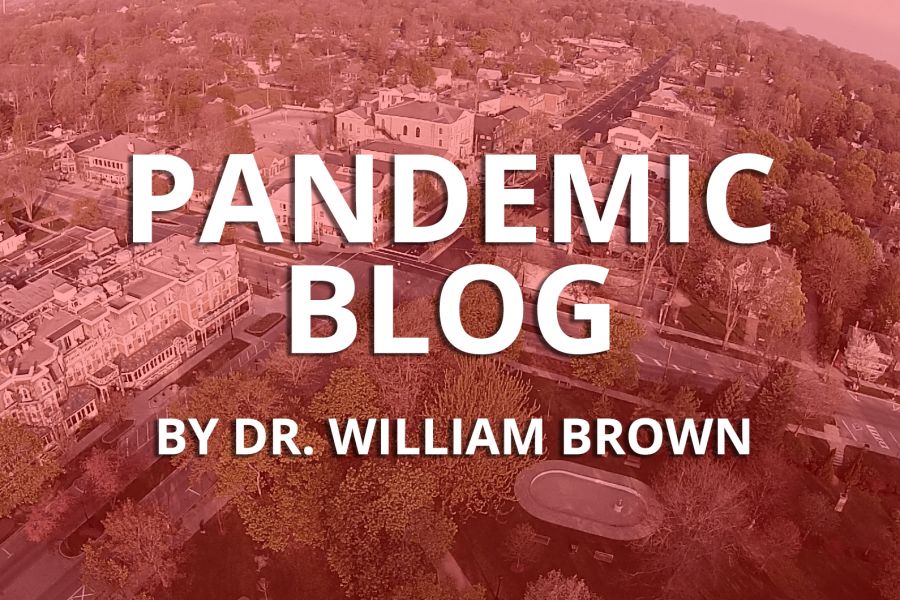Dr. William Brown
Special to The Lake Report
Patients, who recover from COVID-19 – especially those sick enough to need care in an intensive care unit and assisted ventilation – often report fatigue, trouble focusing and thinking clearly, symptoms that are common in non-COVID patients who spent much more than a week in ICU on a ventilator.
Those symptoms following discharge from ICU are usually preceded in the ICU by what’s been aptly called “ICU encephalopathy” – fluctuating consciousness and confusion – the cause of which is complex.
ICUs are busy, noisy and disorienting places to be. Making matters worse is the fact that patients are usually placed on multiple drugs including sedatives, opioids, antibiotics, corticosteroids, drugs to control blood pressure and arrhythmias, clot preventing drugs and sometimes in this pandemic, experimental drugs.
With so many drugs, complex interactions between drugs and impairments in the normal breakdown and excretion of those drugs, make the effects of specific medications sometimes very unpredictable, especially in those patients whose liver and kidneys may not be functioning normally.
The result is that many patients become confused, disoriented and even combative to the point of trying to pull out their endotracheal tubes, arterial and venous lines – making physical restraint necessary.
Other factors contribute to the encephalopathy. A short list might include sepsis from acquired bacterial infections in the ICU, fluctuating blood sugar levels, out of whack electrolytes and/or fluid balance, and subclinical ischemic or hemorrhagic strokes, heart attacks and heart failure and hypoxemia. The list goes on.
It’s obvious from even such an abbreviated list that managing patients in intensive care units is tough. It’s the perfect storm of very sick, often elderly patients, challenges identifying and effectively managing so many factors in the face sometimes of failure of one or more organs and sometimes, simply not knowing what can or should or should not be done. That’s life in the ICU.
Bless those physicians, nurses and technologists who work in them for what they do, even if they don’t always get it right or even understand what went wrong in the rush to manage so many very sick patients. The last was certainly the case with COVID-19 in the early stages of this pandemic.
The high incidence of ICU encephalopathy goes a long way to explain why so many patients following discharge report problems with their memory, thinking and trouble sleeping, including nightmares.
Given that much of the energy and resources in the health care system have focused on tamping down the spread of the pandemic using isolation and social distancing and acute care of the most ill, it’s not surprising that little attention has been given so far to the long-term consequences for COVID-19 on survivors, especially the sickest – those managed in ICUs on assisted ventilation.
As yet it’s too early to tell what the outcome may be for the encephalopathy associated with intensive care and COVID-19, but if it's anything like the usual encephalopathy associated with intensive care, the prognosis for recover to pre-COVID-19 levels of cognitive function, is not good, especially for older patients.
Other common post-ICU discharge symptoms include constant tiredness and weakness. In some cases, the weakness is directly related to the use of certain drugs such as neuromuscular blocking agents and corticosteroids.
Another problem that sometimes emerges is weakness and loss of sensation in the distribution of the ulnar nerve in the arm or the common peroneal nerve in the leg directly related to pressure on the nerves – in the case of the ulnar nerve in the region of the elbow or the knee region in the case of the common peroneal nerve. The latter can cause a “drop foot” (inability to cock the foot up). Both neuropathies usually recover, at least partially.
There’s still a lot to learned about COVID-19, but already it’s clear – this virus is a potential killer for the most vulnerable.
And for those who survive the worst, there may be important and disabling sequelae. In the absence then of an effective vaccine or antivirus drug, the tools that work are preventive: awareness of the risks, isolation, social distancing and frequent testing, especially of those who work in long-term care facilities, despite the understandable pressures to reopen.
In the coming months we’ll find out more about the nature, frequency and severity of the long-term consequences as this pandemic.
Dr. William Brown is a professor of neurology at McMaster University and co-founder of the Infohealth series held on the second Wednesday of each month at the Niagara-on-the-Lake Public Library.










